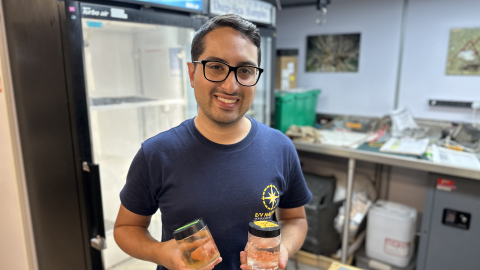
Sebastian Martinez
Tell us about your work/ research. What kinds of things do you do?
My research focuses on the variety of habitats and communities found on seamounts in the western Pacific! In particular, I am investigating communities that reside atop guyots (flat-topped seamounts) within the Pacific Remote Islands National Monument around Wake Atoll. Using submersible video observations, multibeam bathymetry, backscatter data, and sub-bottom profiles, I hope to create a habitat classification standard that can be used to compare protected Pacific guyots to unprotected guyots that are at risk of potential seafloor mining.
What sparked your initial interest in your career?
My interest in marine science began early in elementary school. Being raised around Puget Sound in Washington State, there were many marine-themed school trips, such as local beaches at low tide, tours of salmon ladders, and visits to the Seattle Aquarium! One of my fondest childhood memories was walking down the beach with my parents during low tide and throwing purple ochre and sunflower sea stars back into the ocean. These early exposures to marine science led to my personal interests outside school and made me set my goal of becoming a marine scientist!
Who influenced you or encouraged you the most?
I would say my mother is my biggest influence! She is one of the most perseverant people I have ever known and maintains tremendous curiosity about the world. She played a critical role in my early education, serving as a crucial advocate for my needs as a disabled student through my K-12 experience. Without her, I would have never been able to get to where I am or have the knowledge to advocate for myself in higher education settings not typically built for those with disabilities.
What element of your work/ study do you think is the most fascinating?
My favorite part of my work is seeing how the biological data I work with gets integrated into my seafloor maps! Knowing that each point I see represents an observation of a remarkable, deep-sea organism going about its day is incredibly interesting to me!
How did you get involved with the Nautilus Exploration Program?
In 2013, I was fortunate enough to be selected to join OET’s Honors Research Program, a summer program where a group of high school juniors and seniors learned the principles of ocean exploration at the University of Rhode Island’s Graduate School of Oceanography. This program culminated with participants joining the Corps of Exploration during a leg of the 2013 field season. In my case, I was selected to assist in the exploration of the Mid-Cayman Rise and its surrounding bathymetry. This experience laid the foundation for my return to the E/V Nautilus as an Ocean Science Intern and Data Logger as part of OET’s Science & Engineering Internship Program.
What other jobs led you to your current career?
Most of my previous positions have been as undergraduate assistants to ongoing university research projects. Some notable experiences include video annotation of Pisces V submersible for deep-sea octocorals being impacted by lava flows off the coast of the island of Hawaiʻi, creating an underwater orthomosaic (a photo map akin to those seen on Google Earth) of the ASHES hydrothermal vent field, and processing pelagic samples for a pelagic baseline study of areas above the Clarion-Clipperton Zone.
What are your degrees and certifications?
Bachelor of Science in Marine Biology, University of Hawaiʻi at Mānoa, 2023 Minor in Earth Science Certificate in Geospatial Information Science UH Marine Option Program Certificate
What are your hobbies?
I am a big fan of playing video games and watching television and movies! I also enjoy anything ocean-related, such as going to the beach, tide-pooling, and snorkeling!
What advice would you give someone who wants to have a career like yours?
Go into your education with an open mind! The marine science field is broad, with a considerable amount of academic niches that you can explore. Be willing to try positions with topics that wouldn’t normally be on your radar. You never know what skills you will learn that can be applicable to completely separate fields down the line!
Expeditions
Sebastian participated in the following Ocean Exploration Trust expeditions:

